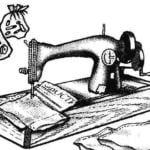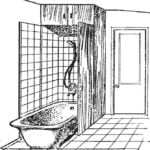 — Key to start!
— Key to start! — Attention, start!
The model is slightly raised on the rails, then picking up speed, quickly disappeared in the blue sky. And the starter has already established a following rocket. “Baikonur” worked with full loading.
Simple starter — guide pin O 5-7 mm, mounted on the launch plate (Fig. 1) with an angle of inclination to the horizontal of at least 60°.
Guides set model of a particular course and provide stability at the initial moment of flight. The greater the height of the rocket, the longer should be the pin. The usual sizes of 1.4—1.6 m.
Start are made using elektrozapalom. Eight dry cells of the type 343 connect four in series, and the resulting two batteries in parallel. You can also use round type elements 373 “Mars” (8 PCs.). Electric
diagram of the remote control run is shown in figure 2. Power sources will place in the box. On one of the panels (preferably on top) install the pilot light, locking the key to the start button. Well, if the starting device is an ammeter and a voltmeter.
Wire from the panel to the igniter it is better to use copper, stranded, PVC insulation, diameter not less than 0.5 mm. For a reliable and quick connections on the ends of the cable installing the cable connectors. Wiring length should be more than 10 m.
Igniter engines model rockets, electric (Fig. 3). This spiral of 5-6 turns of nichrome wiring O 0.2—0.3 mm. When the power supply, it is heated and ignites the fuel. To enhance the thermal pulse spiral is covered with a powder pulp, dissolved in nitroblue, or close to it is fixed a piece of stopin.

Fig. 1. Launcher for model rockets:
1 — pin, 2 — model rocket, 3 — starting stove, 4 — reflector, 5 — Electrosoul.

Fig. 2. Electrical schematic of the control panel start
Since stopin used to transfer the heat pulse from one stage to another, let us dwell on the methods of its manufacture. This is a cotton thread coated with a powder pulp with addition of glue. From the threads doing the wiring O 1-2 mm, impregnated with a solution of potassium nitrate (35 — 40 g per Cup of water) and after drying is immersed in liquid pulp powder (potassium nitrate — 75, sulfur — 12, charcoal — 13 parts by weight). To after drying, does not crumble, add into the solution a little glue. The finished harness is cut on pieces of necessary length.
But what if you need to simultaneously ignite multiple motors? For example, the model-copy of the carrier rocket of the spacecraft “Vostok” and “Soyuz” have four side of the block. For greater similarity start it is desirable that they have been supplied the engine running. In such cases, we recommend to use the following structure.
Prostoi (but not the most reliable) — ignition “ligament”. For example, you have to ignite three engines. Take three pieces of Stopinu length 80 — 100 mm insert nozzle, and the other, free, connect together and attach to the spiral. Stopin must be chosen of the same size and density. Otherwise the rate of combustion will be different and engine simultaneously fail.
Another way is the use of elektrozapalom by the number of motors connected in parallel. Spiral running with the same resistance. The current source needs a comfortable 4-5 times more than razvodnye current for the ignition of the engine.
The main advantage of the pyrotechnic ignition engines cross — “spider” (Fig. 4) reliability. The original design of this fixture for the start of the proposed athlete rocketmodeler S. Aparnev. Case “spider” carved out of steel and has the shape of a Cup upside-down. In the lower part of the sliced inner thread М24х3 to a depth of 23 mm; at the top in the drilled holes soldered on fire leading copper tube with a length of 140 — 150 mm O 5 mm with a wall thickness of 0,4 — 0,5 mm. the Number of tubes depends on the number of combustible engines.
Side in the case of “the spider” has a bracket for mounting the “spider” on the guide pin. In the wall opposite — thread М6Х1 for pilot light. His ebony body drilled two holes O1 mm for insights nichrome filament with a length of 25-30 mm.
Plug steel housing with external thread М24Х3. The top (end] a surface has a cone shape. In preparation for the start of the “spider” features a down tube, Unscrew the cap on the bottom of the case laid the puck out of tissue paper and screwed the pilot light. It send black powder (in the amount of casings from a small-caliber rifle) wrap plug, attach the “spider” on the guide pin and set the model on the starting device.
When a voltage is applied to the filament, the gunpowder flash, thermal pulse through the tubes will pass to the motors. The fuel will ignite. The second model is directed at the sky.
When launching model rockets it is necessary to strictly observe safety measures. Let us discuss some of them.

Fig. 3. Electrosoul

Fig. 4. Perekrest “spider”:
1 — housing (steel) 2 — plug (steel) 3 — the case of the pilot light (ebonite), 4 thread filament (nichrome), 5 — contact, 6 — oneprovides tube (copper, brass), 7 — hole for guide pin.
The start of The models is carried out using a remote device located at a distance of at least 10 m from the model. In order to prevent unintentional ignition of the engine interlock control panel key start should be responsible for the start. Athletic, runs the model, is obliged to fully control the process start. According to the “Rules of competitions on sports flying” model rockets can run at wind speed not exceeding 35 km/h and the line of sight of at least 500 m
Launches of models are made from the starting area is broken into zones. The length and width of the zone is 25-30 m. the Launch pad to run the models at altitude may be in the form of a round platform of O 35-40 m.
To prepare the launcher to start in the starting zone are allowed to go party and one his assistant. Time to start 1 min.
The launch is carried out only with the permission of the head start on command “Key to start”. Then the judge makes the pre start a five second countdown, ending with “start”command.
If there was no ignition of the engine (engine) model rocket and she went to the guide pin, then after one minute the athlete with the permission of head start can go to the launcher to check the ignition system. During his stay in the starting area of not more than 1 min. With the secondary failure of the starting equipment, the athlete receives zero points in this round of the competition.
V. ROZHKOV, master of sports of the USSR



